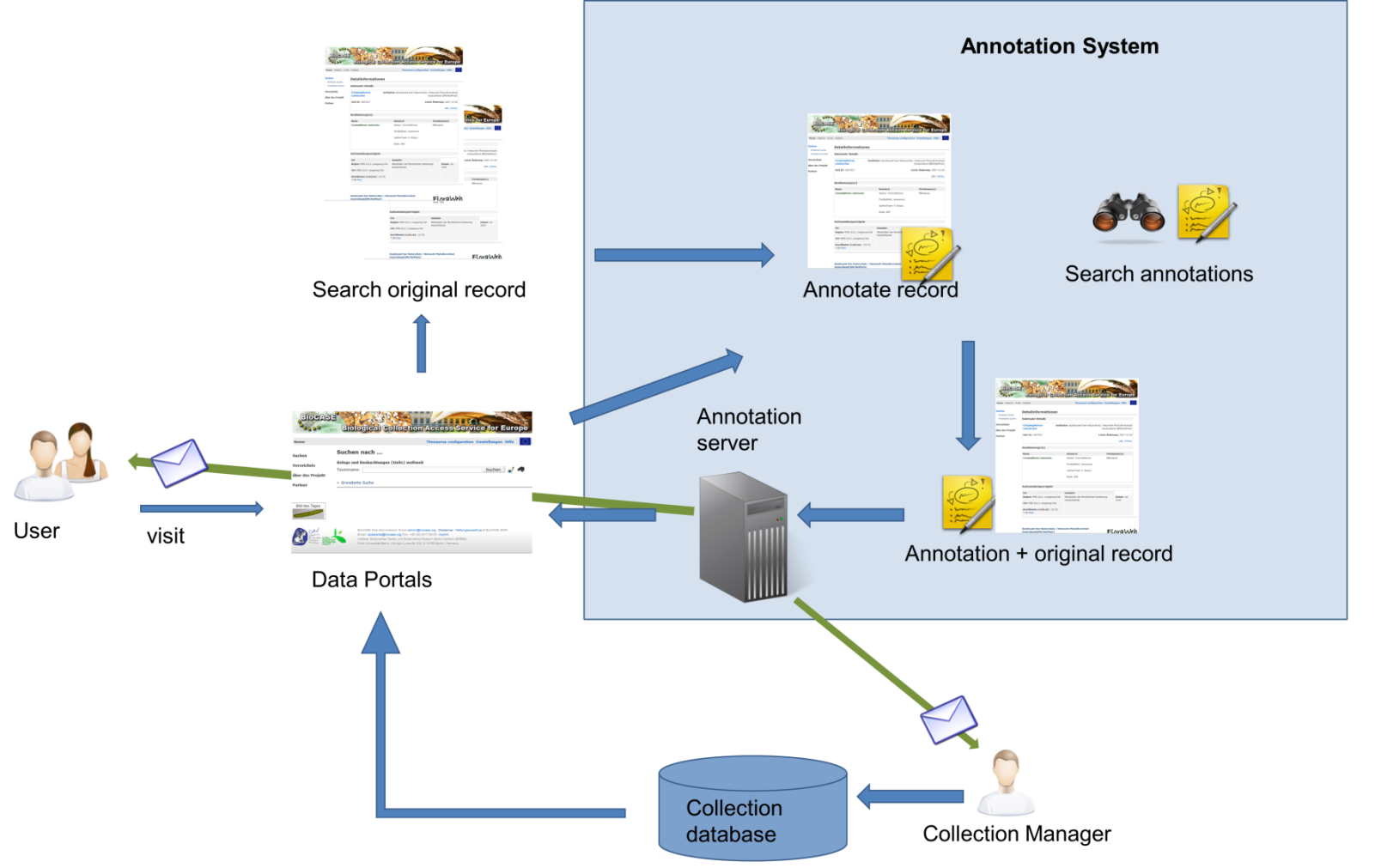Difference between revisions of "Main Page"
O.tschoepe (talk | contribs) |
O.tschoepe (talk | contribs) (→Overall architecture) |
||
| Line 16: | Line 16: | ||
==Overall architecture== | ==Overall architecture== | ||
| − | |||
| + | [[File:AnnoSys_Architektur.png|200px|thumb|left|AnnoSys Architecture]] | ||
General workflow | General workflow | ||
| + | |||
The user visits the GBIF or the BioCase portal to access records. When wishing to annotate a record, he enters the annotation system and, after log in, conducts the annotation. The annotation is then saved on the annotation server together with the original record, both elements are connected via a GUID. The annotated version as well as the original record is then displayed to subsequent users on the data portal. | The user visits the GBIF or the BioCase portal to access records. When wishing to annotate a record, he enters the annotation system and, after log in, conducts the annotation. The annotation is then saved on the annotation server together with the original record, both elements are connected via a GUID. The annotated version as well as the original record is then displayed to subsequent users on the data portal. | ||
It is also possible to search for annotations via the annotation system, using specific criteria (e.g. a taxonomic group or a country). | It is also possible to search for annotations via the annotation system, using specific criteria (e.g. a taxonomic group or a country). | ||
After an annotation has been conducted, a message system informs the collection manager about the changes in the record as well as users, who subscribed to the information service. The collection manager can then decide, whether he wants to adopt the annotation in his local database. | After an annotation has been conducted, a message system informs the collection manager about the changes in the record as well as users, who subscribed to the information service. The collection manager can then decide, whether he wants to adopt the annotation in his local database. | ||
| − | |||
==Funding== | ==Funding== | ||
Revision as of 10:50, 18 June 2012
Contents
A generic annotation system for biodiversity data
The project
The project´s main objective is to exemplarily develop a specification for an annotation data repository for networked and highly complex scientific data. It will be implemented using the example of collection and observation data in the botanic domain provided by the GBIF/BioCase system (currently over 50.8 million records, including 15 million records from natural history collection objects). Analogical to the traditional, written annotation of natural history collection objects, e.g. concerning their taxonomic identity, a procedure is established for data available via the internet. This will allow annotations of single data sets as well as mass annotations for sets of collection objects. Using the example of natural history collection data in the framework of GBIF-Germany the project develops solutions for several cross-domaine and domaine-specific problems and implements them in a pilot system. The issues include:
- categorisation of annotations
- access rights, rights of personality and rights of attribution of annotating scientists
- quality check
- reference and linking of annotations
- conception of a user-friendly system that encourages annotations
- feedback to the distributed data providers
- the potential use of the system in ongoing research projects for filtering of useable data from the overall system
- in general, the integration of data access on annotation data in the overall system of GBIF, BioCASE and GBIF-Germany
Overall architecture
General workflow
The user visits the GBIF or the BioCase portal to access records. When wishing to annotate a record, he enters the annotation system and, after log in, conducts the annotation. The annotation is then saved on the annotation server together with the original record, both elements are connected via a GUID. The annotated version as well as the original record is then displayed to subsequent users on the data portal. It is also possible to search for annotations via the annotation system, using specific criteria (e.g. a taxonomic group or a country). After an annotation has been conducted, a message system informs the collection manager about the changes in the record as well as users, who subscribed to the information service. The collection manager can then decide, whether he wants to adopt the annotation in his local database.
Funding
The AnnotationSystem project is funded by the DFG.

